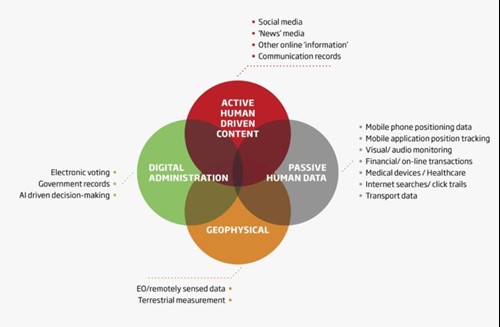Insight
Frontier Data Study – insights and guidance on using digital data to support the SDGs

Insight

The Frontier Data Study, carried out for the UK’s former Department for International Development (DFID), has now been released. The Study, which was led by the NIRAS Digital Futures Hub and supported by DFID’s Frontier Technologies Hub, is relevant to all practitioners in development, from project managers to Evaluators, and from data scientists to overall strategists across different sectors, and anyone wanting to work with data for social good.
The Study looks at:
• the pros and cons of existing digital data sources and techniques, such as ‘big data’ and the use of Artificial Intelligence (AI), and the potential of sources that are coming over the horizon
• what lessons have been learned so far from experiments with digital data
• what needs to be done to optimise the potential at both ground and strategic levels
• how can we best manage risks (such as ethical ones) and optimise opportunities (such as in the Leaving No-One Behind Agenda)
DFID is now part of the UK Government’s Foreign, Commonwealth and Development Office (FCDO). The Study’s lead author and Co-Founder of the Digital Futures Hub, Matthew Shearing, explains that the report is not just another technical piece: “we aimed to provide a unique and practical tool that empowers people in the new FCDO and beyond in the rapidly changing data landscape that we all face, a landscape which can be as intimidating as it is exciting.”

“The study is grounded in world-leading best practice from official statistics, taps into the views of a wide-range of global technical experts and development practitioners, and aims to provide inspiration via real world examples. My hope is that it will help colleagues deal effectively with the complexity we face, not least in dealing with the vast array of technical issues and experts that now seems necessary.”
Highlights of the Study’s conclusions include:
• new digital data sources, such as so-called ‘big data’, do have considerable potential to help us achieve the SDGs, but risks need careful management and improvements in traditional data sources are also essential
• ‘Big data’ is not necessarily a useful term; the digitisation of the data landscape is what is fundamentally the most important
• ‘passive location data from mobile phones’, Earth Observation data, and the use of AI with some new data sources hold the most promise in terms of the potential quality of data
• understanding the different data quality dimensions of digital data sources is essential to using them effectively
• there is no one-size-fits-all solution – development practitioners on-the-ground need to be empowered to decide what works best in each circumstance
• combinations of digital data sources for any specific need are likely to be most useful, especially in combination with traditional data sources
• data users need to be trained to work critically with data scientists, not least in unpicking the promises and potential of new data sources
The study and supporting tools can be found below.
The user guides are designed for UK government staff delivering UK Aid projects and aim to help them address the challenges for development practitioners and data users as listed above, but they are relevant for anyone who wants to work with high potential digital data sources:
User Guide – Using passive location data from mobile phones
User Guide – Earth Observation data (including satellites and drones)
User Guide – AI & Machine Learning
